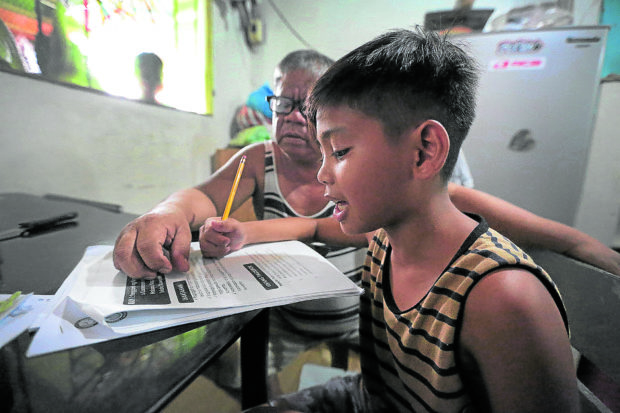
This October 6, 2020, photo shows Victor Torres assisting his grandchild, Grade 2 student John Audrey Bucog, at their house in a fishing village in Baseco Port, Tondo, Manila, in learning school lessons by a module on the second day of classes for public schools, as the Department of Education shifted to distance learning due to the COVID-19 pandemic. INQUIRER PHOTO / GRIG C. MONTEGRANDE
MANILA, Philippines — Senator Sherwin Gatchalian is eyeing a law that would provide every learner in the country with a laptop and access to the internet.
“I think there’s no question that they (learners) should have a laptop and access to the internet now. Not 10 years from now, not 15 years from now, but now,” Gatchalian, chair of the Senate basic education committee, said during a Senate hearing on Friday.
“We’re trying to formulate a law wherein we will give every child, every learner a laptop and an access to the internet, much like access to electricity and water,” he added.
Before this, Education Undersecretary Nepomuceno Malaluan cited the Center for Education Measurement, which found that lack of access to computers and internet connectivity “disadvantages” students and “reduces their ability to profit from instructions on digital literacy.”
“This made a very deep impression on me because times have changed and the basic necessities have changed,” Gatchalian told Malaluan.
Like access to electricity and water, the senator said access to computers or laptops and the internet is also a “basic necessity.”
“Now the question here is, who will pay for it? Because affordability becomes an issue and that’s what we are trying to solve,” he said.
“That’s a challenge for our government to make sure that every child every learner has a laptop and internet in their homes,” he added.
During the hearing, Malaluan said that as of August 27, DepEd recorded—through a learner’s survey during the enrollment period—1.9 million enrollees with laptops, 6.2 million with smartphones, and 3.6 million with access to the internet.
As of late August, DepEd logged 21.81 million enrollees in public schools. This increased to 22.765 million by November 11.
Because schools were forced to shut down due to the threat of COVID-19, DepEd implemented blended learning for the current School Year 2020-2021, which opened on October 5.
The DepEd solution required schools to shift from conventional to “hybrid” learning, called as such because it involved a mix of distant online learning and modules delivered to students’ doorsteps or picked up from DepEd sites.
Electronic media delivered by the internet, radio, and TV broadcasts to mobile devices, computers, TV, and radio sets became a necessary component of blended or hybrid learning.
KGA
RELATED STORY
The promises and pitfalls of blended learning in PH